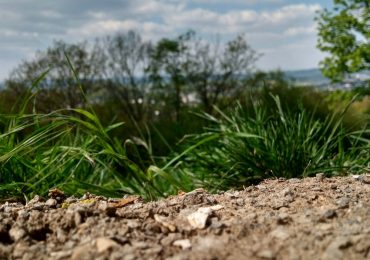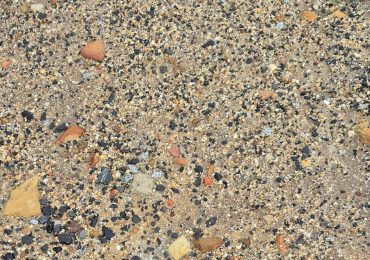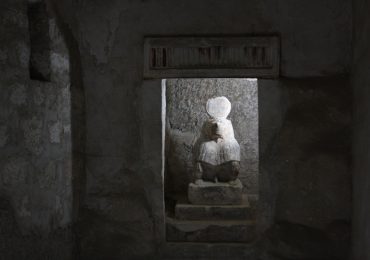The JRB presents a new piece of creative non-fiction by Masiyaleti Mbewe.
~~~
Father Father Void Father Void Void Father
1.
My father is dead but his ghost shuffles around the house fully fleshed. Even though as each day passes he continues to vanish further into himself, this house is still too small for him; he just takes up too much space. When I cross paths with his crooked gait in the corridor or find him hovering in the kitchen, I avoid his gaze and keep my head down. I stare at a random spot on the floor so hard that it warps. I ignore the sound of cabinets opening and closing, of water spilling into a glass, of his throat clearing. He cannot know that I can see him and he cannot know that I can hear him because I fear that this haunting will intensify.
I’ve told her not to but my mother still talks to him, pretending he is real. She still, over the coil of a red hotplate, cooks for him, serves him the best cuts of meat drowned in hearty brown onion soup. She even argues with him and, I swear, the brows and the voices raised in anger are what keep him here, keep him tormenting us with the echoes of what his life should have been, how it actually was and what it will never be. It’s been going on since 1992, since my parents fled a bizarre religious cult in Zambia and crossed the border into Botswana where they raised what eventually became four children. It was a clichéd immigrant upbringing, painfully ordinary in every other way besides my father’s sporadic insistence on taking out his inability to acquire wealth onto us and my mother’s cultural obligation to support him as he did.
When he was still alive and I was still a child, the father I once had told stories. During the blackouts that punctuated our almost middle-class lives, to keep busy, my siblings and I gathered in the candle-lit living room and listened to the stories about his childhood in Zambia. There were tales of the mission school he went to, memories of growing up with his
grandmother in Kamoto Village in the nineteen-sixties or meticulous descriptions of how he and his friends collected wild honey from the hives they found in hollow tree trunks when they played in the forest. But, my favourite story was the one he told about the sentient ball of fire that chased him all the way from his friend’s village, through a valley of reeds and down to the Musandile River, where he crossed over and got away. He swore it was real, and I believed him. He told that story so many times and the details never changed. I saw the sky shift into a purply twilight over his boyish frame and felt the heat lick the back of my neck when he described the way he ran through the darkening valley, away from the spitting ball of fire, his face smacking into the reeds. The relief he remembered feeling when, standing on the other side of that river, he realised he had escaped, became my own. I wonder now if all the strangeness that salts the stories I write is a direct result of the evenings I spent as a child, sitting at my father’s feet, believing. I also wonder if I am urgently choosing to misremember, to embellish. If there is something I have missed? A flash of quick cruelty lost in my desperation to salvage an instance in time when interacting with my father felt normal?
How poignant were those stories, really?
2.
I am twenty-nine years old the first and last time my father tells me to FUCK OFF!
He also dies right there and then. There is no wailing, no funeral, no wake or endless stream of well-meaning condolences. He just dies.
3.
Because I’ve since come into the awareness that I had been keeping score, there had been littler, more subtler deaths—episodes where my father slipped in and out of mortality. There was the time my father told my younger brother that he wished he had never been born; the time he told me to take a bath in bleach because I was dirty and ugly for having skin the same shade as his; there were bursts of misplaced anger that only cooled when his hand met a cheek or the back of someone’s head.
When these disorienting things happened, we would pull away from him and there was a peace that came with that distance. But, before we could settle into it, my father’s reintroduction back into our lives came in the form of coercion. My mother, hellbent on being the good, Christian wife with the close family, would ask us to forget these verbal cleavings as if they didn’t mar us, as if they were incoherent mumblings and not pointed assaults. If we resisted, we were threatened with ancestral curses that would follow us and ensure we were unsuccessful at anything worthwhile we tried to do, because it was unAfrican to turn away from a parent no matter what they did. Even as children, we were the ones burdened with thoughtfulness and consideration, the idea that family was indisposable. My father on the other hand was given boundless room to swing the blade of his tongue around with no regard for whose throat it slit. That apparently, was an African enough thing.
4.
At some point, I don’t remember when but I was an adult by then, my father was diagnosed with diabetes. It was as if his body in some entirely too metaphorical way could not handle any sweetness. He was incapable of absorbing love, kindness or compassion, nor would any of it radiate from him. In fact, as he got sicker, as his teeth became the biggest things in his head, his blood seemed to clot with bitterness. He was so calculating, so vile. So acutely aware of everyone’s vulnerabilities that conversations with him often left you shaking with shame. Moments like those were particularly maddening for me because of the way they collapsed over each other; I had been promised a better father after my last humiliation, after my mother’s slithering ways convinced me to soften up to him, forgive him. And yet, here I was, a fool again. I had betrayed myself, the part of me that knew there was no virtue in suffering. The part of me I had wanted to keep safe and away from any more disappointment. Every time it happened, that part of me would become sharp whenever I took a deep breath—it could have been the cigarettes but I suspect it was the start of something my father triggered metastasising.
5.
The day my father and I argue and he tells me to FUCK OFF! and he dies, I deconstruct the sound of that phrase, mouth out the letters until the Fs split my bottom lip. I contend with what my father has asked me to do and it is a foul thing, a soul dismissal. Vulgar and final. Maybe it’s because my early twenties were full of sad stories about people, young and old, determined to crush me to death between the ground and their abusive thumbs that I, upon perceiving what he meant, simply refused to endure that sort of treatment from anyone anymore. I had found those people on the street, they could easily have been stray dogs I chased away with an open mouthed VOETSEK! I did not, however, find my father on the street. The gods entrusted him with my care and he chose to maim me instead. It was disgusting, something I could not unhear, unsee or unfeel. There was and continues to be no reality that exists for me where a father like that is alive and well and no amount of necromantic family meetings held around an old dining table will resolve this schism.
6.
In the years since that argument, I have caught myself tilting into a vat of paranoia. Because I am my father’s child and life can be ironic, I imagine that one day I’ll bite down into an unremarkable jam doughnut while standing in some café somewhere and my insides will break. My pancreas in some sort of protest won’t pump enough insulin into my bloodstream and so, between pissing too much and slow healing paper cuts, I will lose the ability to be receptive to all the things I have come to hold dear about loving and being loved. As a consequence, my writing will blur into dishonest drivel and this will turn me into a surly, vicious bitch, the spitting image of my father, leaking venom everywhere. Of course, instead of a plot of land, a trust fund or his old BMW, these cerebral and bodily ailments will be the things my father leaves behind for me to inherit.
7.
You probably don’t need me to tell you this, but my father is not actually dead. His ghost, however, does shuffle around the house announcing itself with the sound of ugly voices booming from his phone, cutting and distorting the space around him. I am alarmed by the sheer volume of prerecorded American right-wing podcasts, FOX News soundbites and dizzying conspiracy theories on YouTube that he gluttonously consumes. I think it so strange that a man who has lived his whole life between borders would find comfort in such rotten, peopleless ideas, but then how he treats us begins to make more sense. This is someone whose philosophy in life hinges on the derivation of joy from the infliction of pain on those around him. Had my father died a month before he told me to FUCK OFF! perhaps then I would have surrendered to the sort of dysfunctional dissonance that death lends. Perhaps I would have been willing to pretend that he was someone whose memory I could have obscured with exaggerated and unearned decency. But now, I find myself disturbingly looking forward to the day he collapses in the garden and my mother’s screams let me know that, finally, it is for real. Only then will we begin to haemorrhage the poison that my father’s life has injected into ours.
In the space we inhabit before we get to that point, I have already buried him.
8.
There’s a photograph bordered by a red frame hanging in my parent’s living room that I try not to look at anymore. In it, I am maybe two years old and standing to the right is my older sister, she’s maybe five. I assume it was taken right before we left for Botswana because we are in a garden somewhere in Ndola. We are all dressed in white and I am smiling, absently. Four milk teeth, new and firm, puncture through my bottom gums and my head is thrown back in abandon. I look delighted, I look safe, but then I see the large arms wrapped around me, the overexposed polo shirt they are reaching from and the tennis trousers that are bordering my head like a halo. A little further up, where my father’s face should be, there is a void.
~~~
- Masiyaleti Mbewe is a Zambian writer and photographer. They are a graduate of the University of East Anglia’s Creative Writing MA where they were a Miles Morland Scholar. Their culture writing has appeared in the Los Angeles Review of Books, Refinery29, Amaka Studio and elsewhere. Their fiction has been longlisted for the Short Story Day Africa Prize as well as the Kalemba Short Story Prize.





